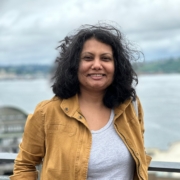Piyusha Chatterjee is an oral historian and an interdisciplinary researcher working on gendering the Global South experiences of global economic restructuring and deindustrialization since the 1960s. Her research interests are at the intersection of labour, urban and media studies. Using the deindustrialization framework, she wants to create spaces for dialogues between Global South and North to better understand their unique challenges and the gaps in the “global” economy.
After completing her PhD in the interdisciplinary Individualized Program at Concordia University, Montreal, in 2022, she worked as the Coordinator and Community Facilitator at the Centre for Oral History and Digital Storytelling where she facilitated university-community dialogues and supported a community of oral historians in their research and collaboration initiatives. Dr. Chatterjee has an MA in English from the English and Foreign Languages University in India and ten years of work experience in the fields of print journalism and oral history research in India.
She will be starting in her new role as Research Associate at the University of Glasgow’s School of Modern Languages & Cultures within the College in August 2023. The position is funded by Social Sciences and Humanities Research Council (SSHRC) through the Deindustrialization and Politics of Our Time project.
Project Statement: “An Unfair Division of Labour: Gendering the Commodity Chain of Textile and Garment Production”
My research project, “An Unfair Division of Labour: Gendering the Commodity Chain of Textile and Garment Production,” examines the uneven and gendered division of labour in the global political economy in the post-1960s’ era. Bringing transnational and Global South perspectives to the conversation on deindustrialization, my project turns to the history of chikankari workers in and around Lucknow in northern India, known for a traditional form of embroidery highly valued in the fashion and clothing industry, to comprehend the ways in which inequalities have been reproduced at the intersection of class, caste, religious identity, race and gender in this handicraft industry following economic restructuring. A second part of this project will focus on generating a topography of labour regulations and workers’ solidarities alongside studying the evolution and role of export councils, trade fairs, non-profits and international organisations in the commodity chain. As this project holds, the grains of inequalities need to be studied locally without losing sight of the transnational scale of the processes and impacts of deindustrialization.
The proposed research will be a major contribution to the field of deindustrialization studies, which requires a deeper engagement with Global South, particularly women workers in economies undergoing rapid industrialization, to understand the variegated experiences of economic restructuring. Theoretically, the project is anchored in feminist scholarships of labour and political economy in India and deindustrialization and urbanisms in the Global South. Drawing upon heterodox economic thought and feminist geography approach to understanding markets as embedded in place, my research aims to address women’s marginalization in the economy with the following questions: How do race, gender, and history of colonisation shape women’s experiences in the labour market in the Global South? Why do these women bear an unfair share of the cost of development? Finally, how do we address relationships of inequalities configured into transnational trade?
Oral history interviews with chikankari workers and a simultaneous study of the other actors in the commodity chain, such as middlemen, suppliers, owners of export firms, designers, and retailers, will reveal the intricate and layered ways in which deindustrialization processes impacted women garment workers in India since the 1970s. A collaboratively developed web-based platform “Bolte Dhaage (speaking threads)” will document the research process and bring stories from the commodity chain into the public domain.




 Source: Store Norske Leksikon
Source: Store Norske Leksikon